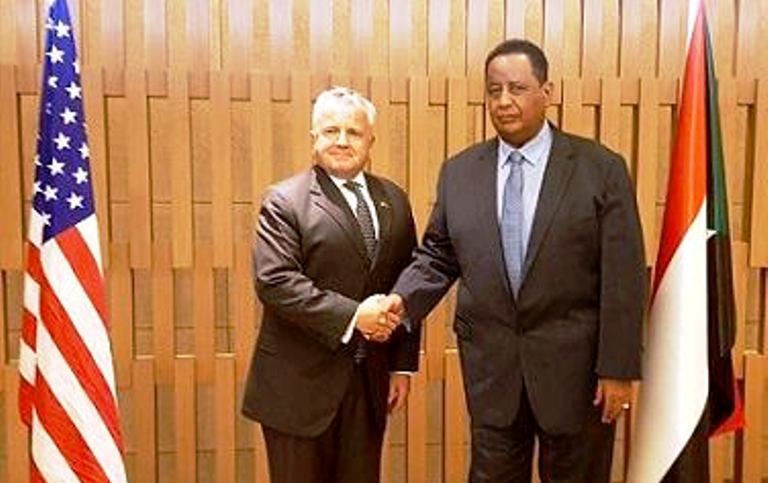Sudan, U.S. launch second phase of normalization, as Khartoum reiterates position on N. Korea

November 16, 2017 (KHARTOUM) – The visiting U.S. Deputy Secretary of State John Sullivan, the Sudanese Foreign Ministry Ibrahim Ghandour Thursday have endorsed a roadmap for the second phase of talks on normalisation of bilateral relations.
Also, during the bilateral meetings in Khartoum, the Sudanese Foreign Ministry formally announced Sudan’s commitment to sever all trade and military ties with North Korea.
Last October Washington permanently cancelled the 20-year economic sanctions on Sudan opening the door for the normalization of bilateral relation and removal of remaining sanctions on the east African country particularly its removal from the list of countries sponsoring terrorism.
Following his arrival to Khartoum Sullivan and his delegation held a closed-door meeting with the Sudanese government delegation headed by Ghandour.
From Washington the State Department issued a statement welcoming “the Government of Sudan’s pledge to sever all trade and military ties with North Korea, adding it Khartoum “will continue engagement on this issue to ensure that this commitment is fully implemented”.
“Isolating the North Korean regime is a top priority for the United States, and is a key element to maintaining peace and stability worldwide. The United States is grateful for Sudan’s commitment to take these important steps in light of the critical threat posed by the DPRK,” added the short statement.
In Khartoum, the spokesperson of the Sudanese foreign ministry issued a statement after the meeting saying that Sullivan considered his Khartoum represents the beginning of the second phase of constructive engagement between the two countries.
Ambassador Gharib Allah Khidir further said that the visiting U.S. official indicated that the second phase aims at enhancing the positive results of the 5 tracks engagement and achieving further progress in the bilateral cooperation in various fields in order to lift the name of Sudan from the list of countries sponsoring terrorism and fully normalize relations in the interest of the peoples of the two countries.
Sullivan also met with the Sudanese First Vice President Bakri Hassan Saleh and discussed with him the ongoing process to normalize the bilateral relations.
In statements to the media, the U.S. official said his meeting with the First Vice President dealt with the second phase of the normalization process and the implementation of UN resolutions against North Korea as well as issues related to human rights and religious freedoms, “which are of great importance to the United States”.
Sudanese officials insist on the need to remove Sudan from the list of terror states, pointing that the country cannot benefit from the debt relief and international development aid without this measure.
But Washington insists on the need to improve Human rights, religious freedom and other freedoms in a way to create a conducive environment for the opposition group to take part in the ongoing constitutional process after the signing of a peace agreement with the armed groups.
The U.S. in a joint action with the Troika countries seek to encourage Khartoum and the opposition groups to reach a peace agreement based on the African Union-brokered roadmap agreement.
However, the opposition groups seems unhappy with the rapprochement between Washington and Khartoum saying it contributes to eases international pressures on the regime of President Omer al-Bashir and encourages it to ignore the democratic process.
SPLM-N Agar deputy chairman Yasir Arman posted a message on Twitter Thursday wondering why Trump administration does not engage on equal basis with the opposition groups.
“Millions of Sudanese victims wonder if John Sullivan’s (@StateDept) Khartoum visit included issues of peace, democratic transformation, religious freedom and respect of human rights,” Arman said adding “Why is the U.S. not engaging on an equal basis with civil society & democratic forces in #Sudan?”
On Friday, Sullivan will give a lecture in Omdurman and meet the press before to end his two-day visit to Khartoum.
Ghandour told reporters that the talks also dealt with cooperation in regional security and peace, and pointed out that the U.S. side praised the Sudanese role in the South Sudan’s crisis and the host of refugees from the troubled country.
(ST)
